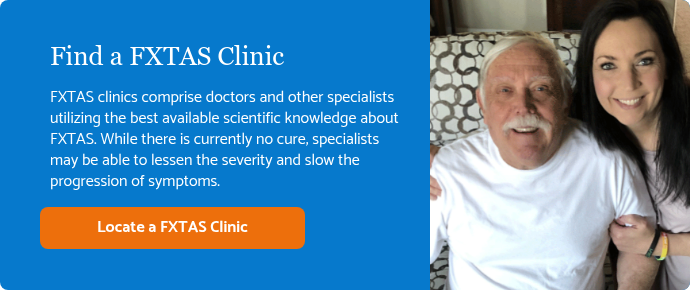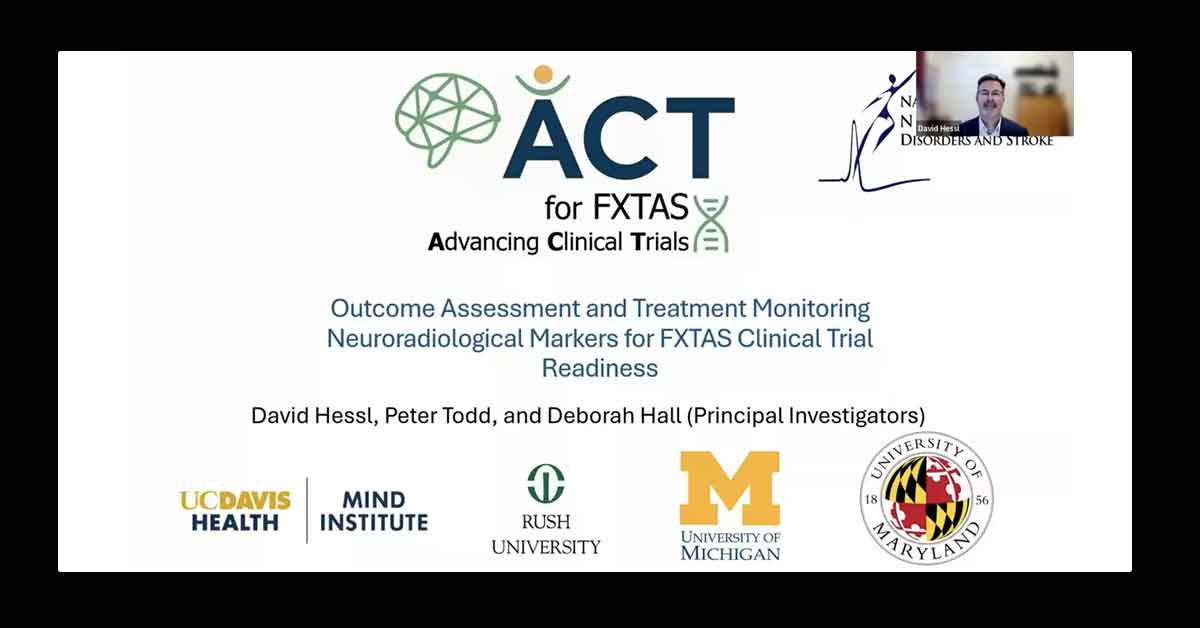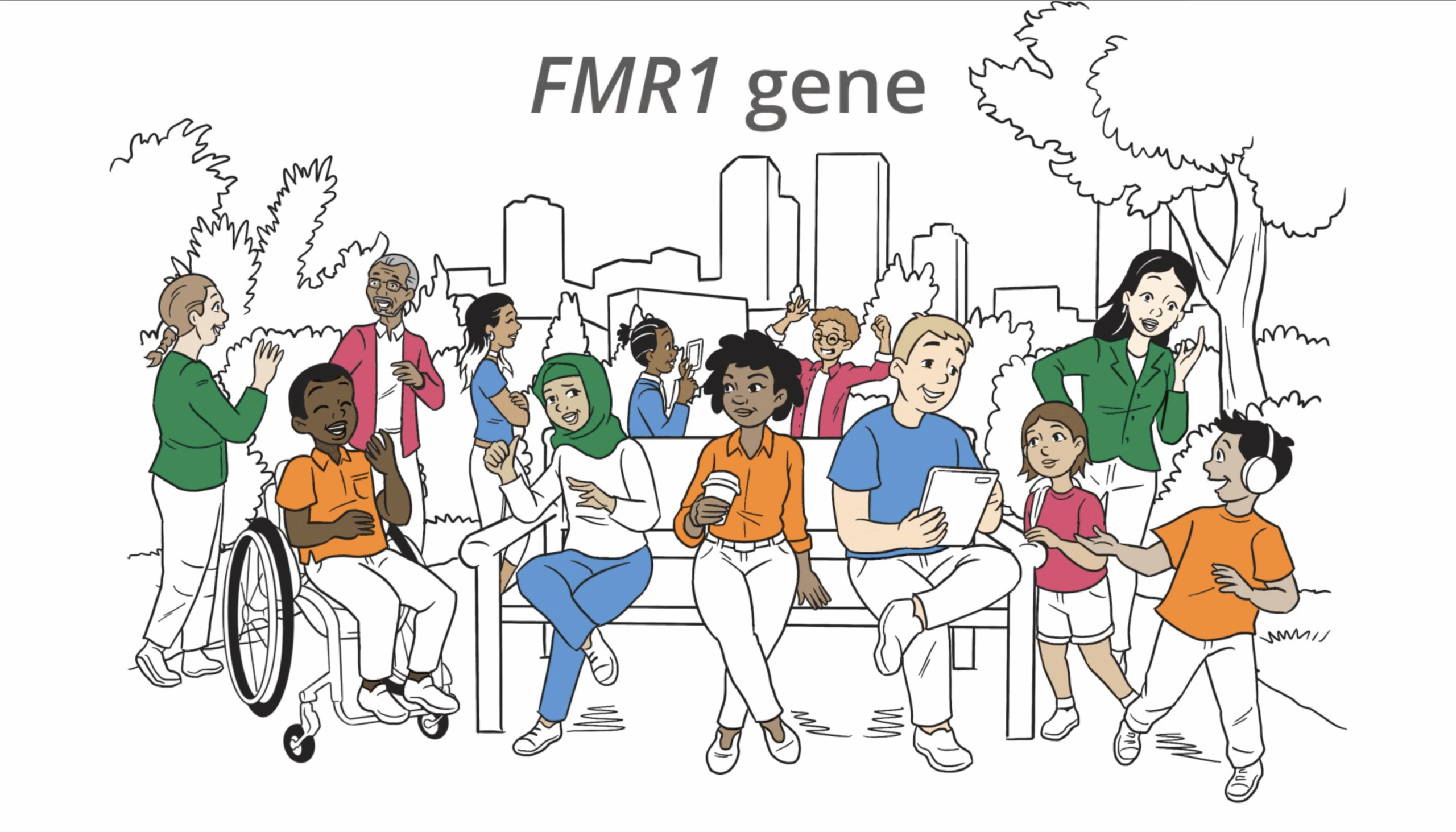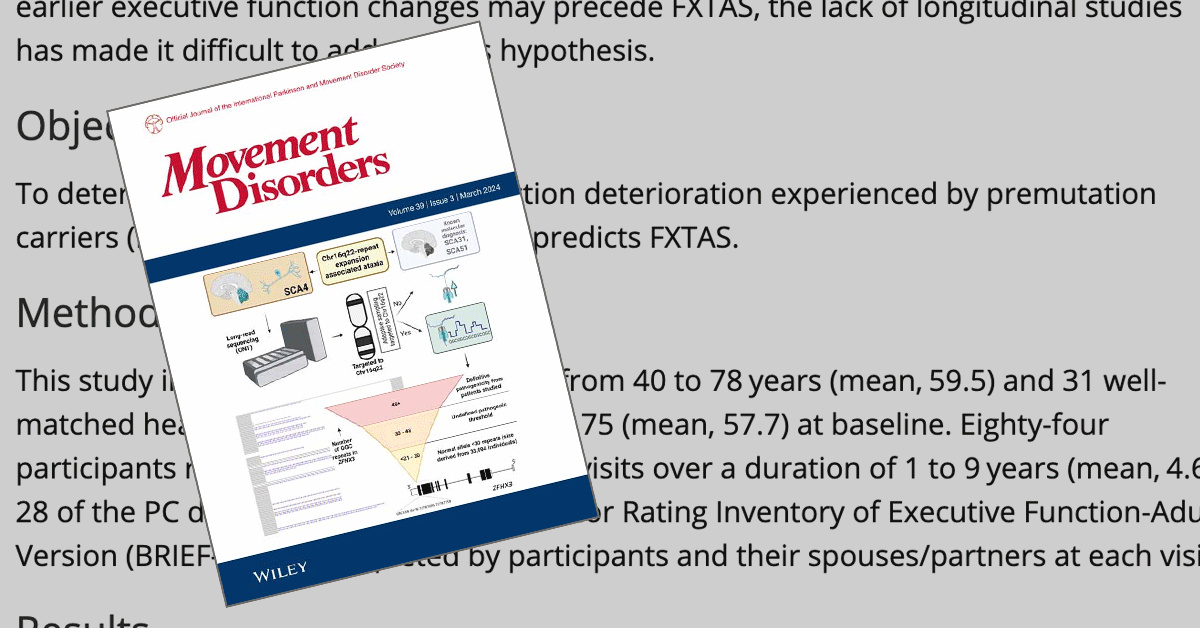What is FXTAS?
Fragile X–associated tremor/ataxia syndrome (FXTAS) is an adult-onset neurodegenerative disorder, more common in males than females over 50 years of age with the Fragile X premutation. FXTAS is associated with tremors, balance problems, and other neurological signs. FXTAS progresses at varying rates in different individuals. The risk of developing FXTAS in any given individual is influenced by their CGG repeat size, sex, and age.
Fragile X-associated tremor/ataxia syndrome is more commonly known as FXTAS and is pronounced faks-tas.
All individuals with FXTAS have the FMR1 premutation (CGG repeats 55–200). The job of the FMR1 Fragile X gene is to make protein (FMRP) that is important in brain development. Researchers believe that (for unknown reasons) having the premutation leads to the overproduction of FMR1 mRNA (which contains the expanded CGG repeats). They believe that the high levels of mRNA are what cause the signs and symptoms of FXTAS, but more research is needed.
Note: Not all individuals with the FMR1 premutation will develop FXTAS, but all individuals with FXTAS have an FMR1 premutation. Researchers are investigating what other factors might contribute to FXTAS in individuals with the FMR1 premutation.
FXTAS Prevalence
FXTAS may be one of the most common adult onset, single-gene neurological diseases similar in prevalence to other neurodegenerative diseases such as ALS (Lou Gehrig’s disease); however, more studies within the general population are necessary before the true incidence is known.[3,4,5,6]
Among individuals with the FMR1 premutation, about 40% of males older than 50 years and 8%-16% of women older than 40 years develop FXTAS.[1]
However, the risk of FXTAS in any given individual is influenced by their:
- CGG repeat size — A larger number of repeats increases the risk.
- Sex — Males are at greater risk
- Age — Symptoms are more common at older ages
Considering all of these factors and literature to date, it is estimated that the lifetime prevalence of FXTAS in the general population is approximately 1 in 8,000.[2] This indicates that FXTAS is significantly less common than essential tremor or Parkinson’s disease in older adults.
For men who have the FMR1 premutation, the chance of developing core symptoms of FXTAS (tremor, problems with walking or balance) increases with age, as shown below.
% Chance of Male Premutation Carriers Developing Core Symptoms of FXTAS

For males who are premutation carriers, the chance of developing core symptoms of FXTAS (tremor, problems with walking/balance) increases with age:
- Ages 50-59 the chance is about 17%.
- Ages 60-69 about 38%.
- Ages 70-79 about 47%.
- Over 80 years old, about 75% will develop symptoms of FXTAS.
Studies of females with the FMR1 premutation (within families already known to have someone with a Fragile X condition) have found that about 8%-16% develop some FXTAS symptoms. The symptoms in females tend to be milder.
FXTAS Signs & Symptoms
The symptoms of FXTAS are divided into minor and major clinical and MRI findings. The diagnosis is then categorized into definite, probable, or possible FXTAS. The type and severity of FXTAS symptoms vary among individuals. Some will have multiple symptoms that progress rapidly, while others will have few symptoms that remain mild over many years.
There are also comorbid symptoms of FXTAS, which means they there often occur but aren’t used to confirm the diagnosis. For example, a sore throat is a symptom of strep throat, but cultures, fever, and other observations and tests are also used to make the diagnosis.
Major Symptoms
- Intention Tremor: A tremor of the hand when using utensils, writing instruments, reaching for or pouring something. The tremor is not as apparent at rest.
- Gait Ataxias: Balance problems may include falling, needed support when walking or going up or down stairs, trouble stepping on or off curbs, generalized instability, or display of a wide-based gait.
- MRI Findings: Signs strongly associated with (but not unique to) FXTAS include white matter lesions involving middle cerebellar peduncles (MCP).
- Neuropathology Findings: “FXTAS inclusions” may be found within brain cells.
Minor FXTAS Symptoms
- Parkinsonism: Also known as resting tremors.
- Short-Term Memory Problems: This can be difficult to determine since it is natural for short-term memory to deteriorate as we age. However, in FXTAS it can change more rapidly than normal or may be more dramatic, such as forgetting what one ate, said, or did shortly after the event.
- Executive Function or Decision-Making Problems: Executive function includes the ability to initiate and complete an activity, to adapt and change behavior as needed, and to anticipate and plan for new tasks and situations. Executive function allows us to anticipate outcomes, solve problems, and generalize from one situation to the next.
Watch the webinar: FMR1 Carriers Report Executive Function Changes Prior to FXTAS: A Longitudinal Study, with Dr. David Hessl.
- MRI Findings: In addition to those listed above, are findings referred to as “lesions of cerebral white matter,” and other findings indicating “moderate to severe generalized brain atrophy.”
Other FXTAS Symptoms
These are not considered to be official diagnostic criteria.
- Neuropathy: Numbness or tingling of the extremities.
- Mood Issues: Including instability, irritability, explosive outbursts, personality changes.
- Cognitive Decline: Including loss of skills such as math and reading.
- Autonomic Functioning: Including problems such as impotence and loss of bladder or bowel functions.
- Co-occuring Conditions: Including high blood pressure, thyroid disorders, and fibromyalgia (more common in females and very common in the general population).
- Seizures
TIP Speak with your healthcare provider about any concerns with any anesthesia. You could also consider sharing this article: General Anesthetic Use in Fragile X Spectrum Disorders from the NIH.
Testing for FXTAS
FXTAS only occurs in individuals with a Fragile X (FMR1) premutation. Therefore, anyone considered for this diagnosis must be tested for and confirmed as having the Fragile X premutation. This involves DNA testing of the individual’s FMR1 gene.

Genetic Counseling and Family Support
Genetic counseling includes family and medical histories to assess the chance of carriers (premutations) throughout a family’s lineage.
FXTAS Treatment & Intervention
Each person with FXTAS is unique, with their own medical history, biological makeup, and personality, so each will have their own set of problems. While most will have handshaking and balance problems, these will vary in severity and the need for treatment.
While most of the FXTAS symptoms are neurological, many other body systems are also affected. To receive optimal care, it is best to have a medical care team that is knowledgeable about FXTAS. The team should include a neurologist and primary care physician at a minimum. Other specialists in the areas of psychiatry, psychology, rehabilitation, urology, cardiology, and movement disorders neurology, may also be needed.
There are three purposes of therapy for FXTAS:
- To reduce symptoms.
- To slow the progression of disease.
- To cure disease.
While there is no known cure or treatments to slow the progression of FXTAS, there are a number of treatments that many have found helpful in reducing symptoms. Research is currently being done to identify possible treatments specific to FXTAS. In the meantime, clinicians may treat the symptoms of FXTAS using treatments that are already available for those symptoms.
Useful treatments for FXTAS include:
- Medications.
- Psychological and genetic counseling.
- Rehabilitative treatments such as speech, occupational, and physical therapy.
- Gait training.
- Surgery.
- Family supportive services and counseling are also important.
Fragile X-Associated Tremor/Ataxia Syndrome (FXTAS)
Therapy for FXTAS aims to reduce symptoms and eventually slow the progression of the disease.
FXTAS Clinics
FXTAS clinics are members of the NFXF’s International FXTAS Consortium (IFC) and specialize in FXTAS. They are comprised of doctors (primarily neurologists and movement disorder specialists), therapists, researchers, and other specialists who treat FXTAS by utilizing the best available scientific knowledge about its known causes.
While there is currently no cure for FXTAS, specialists may be able to lessen the severity or slow the progression of symptoms with various treatment options.
More FXTAS Resources
FXTAS Webinars
FXTAS Research Results
Additional FXTAS Resources
Support
NFXF FXTAS Facebook Support Group
For everyone who would like to connect with others dealing with FXTAS.
Organizations
International Parkinson and Movement Disorder Society
Helpful Tools
Find a Movement Disorders Specialist (International Parkinson and Movement Disorder Society)
Journal Articles
Treatment of Fragile X-Associated Tremor Ataxia Syndrome (FXTAS) and Related Neurological Problems (Clinical Interventions in Aging)
Fragile X-Associated Tremor/Ataxia Syndrome: Clinical Features, Genetics, and Testing Guidelines (Movement Disorders)







